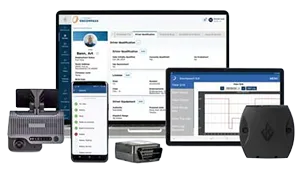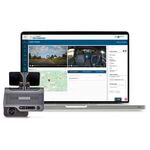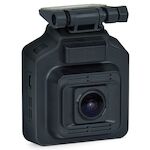
Driver Performance Management
Driver performance is critical to your company's success. By monitoring and analyzing your vehicles and drivers, you'll get data that helps you improve decision-making and drive improvements to both safety and operations:
- Increase driver retention
- Improve the bottom line
- Reduce risk
- Exonerate falsely-accused drivers
- Reduce driver detention
- Improve trip planning
- Automate IFTA and IRP reporting
When combining the J. J. Keller Encompass® Platform with the video intelligence of the VideoProtects Fleet Camera System and Encompass® Vehicle Tracking, you'll benefit from a comprehensive view of your driver and vehicle performance management. The VideoProtects Fleet Camera System allows you to provide timely driver coaching and training when you identify problematic driver behavior. Encompass® Vehicle Tracking helps you improve vehicle utilization, customer service, and trip planning. It even automates your IRP and IFTA reporting.
What You Need to Know
Generally, a subpoena will be required if the carrier and driver do not want to share the video footage voluntarily. However, privacy and evidential laws requiring subpoenas may vary by state or even municipality. Therefore, you will need to consult with an attorney that has knowledge of these rules in the jurisdiction involved.
Each situation is different and should be treated with caution, but there may be a situation at the scene where it makes sense for a driver, with specific company approval, to show footage upon request from enforcement (not likely). There have been instances where this has resulted in the avoidance of a citation.
Vehicle trackers reduce risk and improve productivity in numerous ways:
- Vehicle trackers can verify your drivers/employees don’t make any unnecessary stops and take the optimal route.
- Vehicle trackers tell you where and for how long a vehicle was stopped, helping you determine if the driver/employee was as productive as possible.
- Some trackers allow you to see the driver’s speed, helping you address poor driving habits immediately and reduce risk.
- Insurance providers may require vehicle trackers to be installed as a condition of coverage for vehicle recovery or may reduce premiums with their use.
- With real-time locations for every vehicle, you can quickly dispatch drivers to unexpected opportunities or meet immediate service needs.
Vehicle trackers can capture vehicle data from original GPS and the engine, including current location data, date and time intervals that validate total distances traveled in each state or province, traffic and weather, GPS speed, vehicle tracking history, and more.
- Vehicle trackers do not require a driver interface. A quick install lets you see where your drivers are, where they have been, their trip history, and how fast they drove.
- Drivers can be more productive since vehicle trackers can capture the information usually completed by the driver on an Individual Vehicle Mileage Report (IVMR). They can spend more time driving and less time doing paperwork.
- With vehicle trackers, dispatch can see where drivers are, allowing them to predict delivery times, respond to unexpected customer requests, and plan for traffic and weather delays.
- Vehicle trackers help you protect your vehicles, providing quicker recovery times if stolen or abandoned.
Vehicle tracking systems, including global positioning systems (GPS), may be used in place of trip reports completed by the driver. IFTA allows carriers to use technology solutions to capture and report the required information. The logic here is that if you have a vehicle tracker capable of tracking all miles by the vehicle's jurisdiction, it only makes sense to move the recordkeeping responsibility away from the driver and put it on the ELD system.
Currently, any electronic system needs to meet the requirements listed in Section P540 of the IFTA Procedures Manual and Article 10, Section 1010, of the International Registration Plan. Under these rules, an electronic system must be able to capture the following items:
- Distance traveled in each jurisdiction,
- Original GPS or other location data for the vehicle to which the records pertain,
- Date and time of each GPS or other system reading, at intervals sufficient to validate the total distance traveled in each jurisdiction,
- Route of the vehicle's travel,
- Beginning and ending reading from the odometer, ECM, or any similar device for the period to which the records pertain,
- The calculated distance between each GPS or other system reading,
- Total distance traveled by the vehicle,
- VIN or vehicle unit number, and
- The location of each GPS or other system reading.












